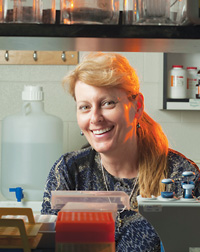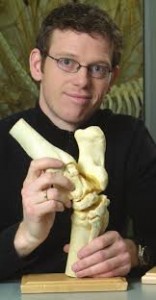Genetics, stem cells and back pain are among University of Guelph research projects awarded funding by the provincial government at the end of August.
The Ontario Ministry of Research, Innovation and Science announced Early Researcher Awards worth $140,000 each for Profs. Stephen Brown, Human Health and Nutritional Sciences, and Thomas Koch, Biomedical Sciences. Also announced were Large-Scale Applied Research Project awards for pathobiology professor Bonnie Mallard ($250,000) and Filippo Miglior, Animal Biosciences ($390,258).

“These researchers are studying areas central to the University of Guelph’s mission, showcasing our leading role in Canadian food research and promoting the health and well-being of both people and animals,” said Malcolm Campbell, vice-president (research).
Brown will study the role of muscles in back problems to help prevent and relieve back pain. He said poor muscle function can lead to back problems, and back pain in turn can cause muscle degeneration and dysfunction.
“Appropriate muscle function is a powerful tool to prevent back injury and pain,” he said, “and poor muscle function greatly limits rehabilitative efforts for chronic back pain.”
His team will compare healthy people and subjects with back pain, and will study rodents with spinal disorders.

Mallard hopes to make the Canadian pork industry more competitive and to ensure food safety.
Her team is developing genetic tools, including High Immune Response technology, to help breeders select more disease-resistant pigs. The researchers also aim to improve pig production and reduce the use of antibiotics.
“Pork is the second-most consumed meat in Canada, and it is exported to more than 100 countries,” said post-doctoral researcher Julie Schmied. “Managing diseases in pork populations will become increasingly important as global demand for animal proteins rises in concert with growing populations.”

Koch uses stem cells and related technologies to improve joint health in horses and dogs, which are important pre-clinical models of human joint disease.
“Emerging treatment approaches through stem cell and regenerative medicine require careful safety and efficacy studies for conditions that are not life-threatening, but nonetheless decrease patient quality of life,” Koch said.
“The intersection of companion animal and human joint pain and novel stem cell-based therapies provides a great opportunity to contribute to animal and human health within one research program.”

Miglior uses genomics to improve feed efficiency and reduce methane emissions in livestock, such as dairy cows.
The Canadian dairy industry stands to gain more than $100 million annually by improving feed efficiency and reducing methane emissions, improvements that will also reduce the industry’s environmental footprint.